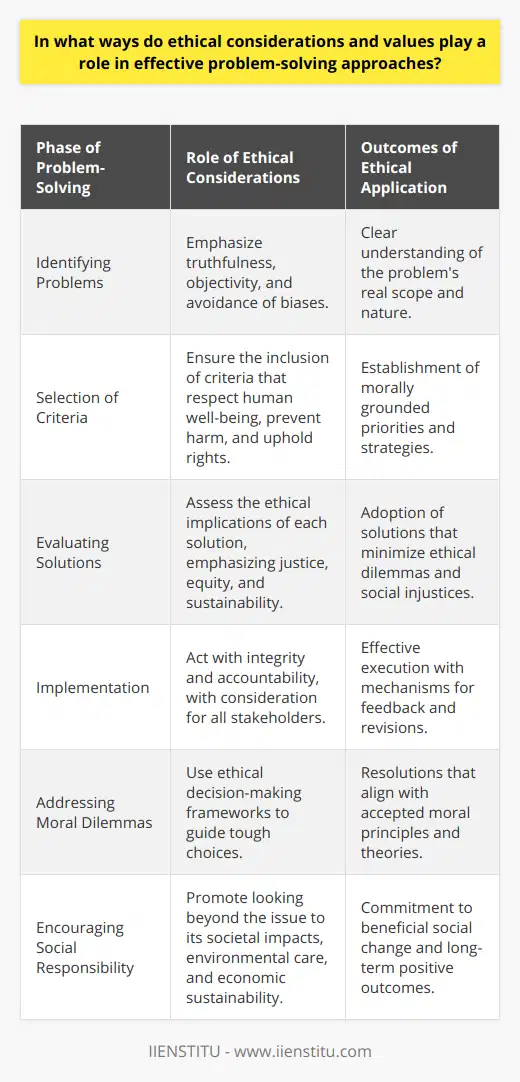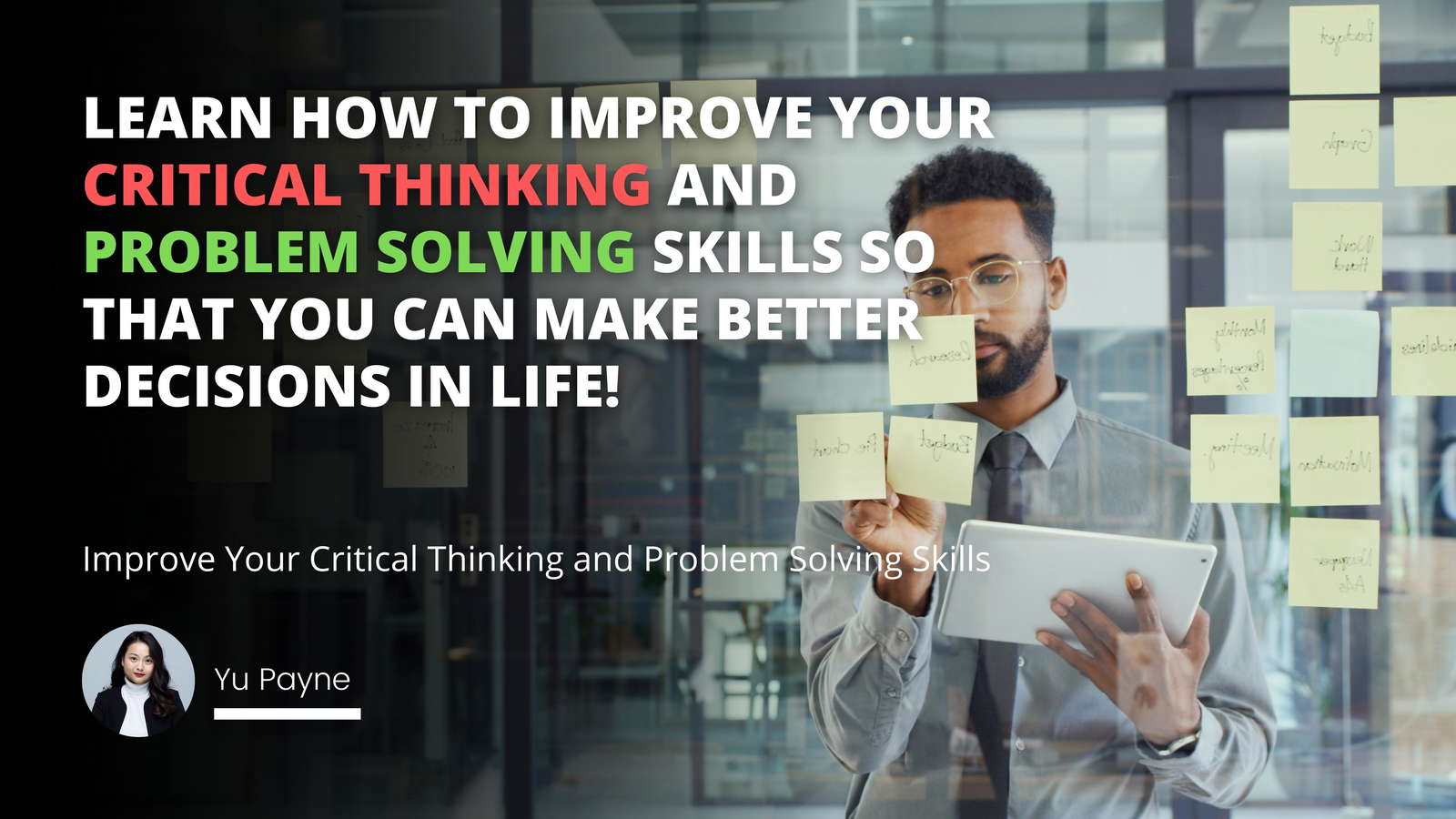
Have you ever found yourself stuck in a situation where no matter how hard you tried, you just couldn't find a way out? I remember a time when I was working on a project that seemed impossible to crack. I spent countless hours staring at my computer screen, my coffee turning cold beside me. Frustration was building up, and I felt like giving up. But then, I took a step back, took a deep breath, and began to approach the problem differently. Little did I know, this shift in mindset would not only help me solve that particular issue but also transform the way I handle challenges in life.
Unlocking the Power of Problem-Solving Skills
In today's fast-paced world, problem-solving skills are not just an asset—they're a necessity. Whether you're navigating the complexities of a new job, dealing with personal hurdles, or even trying to optimize supply chain management process tips for your business, the ability to solve problems effectively is crucial. But what does it really mean to be a good problem solver? Let's delve into the seven essential problem-solving skills that can set you on the path to success.
1. Identifying the Problem
The first step in any problem-solving journey is recognizing that there's a problem in the first place. It sounds straightforward, doesn't it? But you'd be surprised how often we overlook issues because we're too wrapped up in our routines. I once worked with a team where productivity was steadily declining. Everyone was so focused on meeting deadlines that we didn't realize we had a communication breakdown. It wasn't until we sat down and openly discussed our workflow that we identified the root cause.
Key tips for identifying problems:
Pay attention to patterns that disrupt your regular activities.
Listen to feedback from others—they might see what you don't.
Reflect on your goals and whether you're moving towards them.
As the famous psychologist Daniel Kahneman points out in his book Thinking, Fast and Slow, our brains are wired to take mental shortcuts [^1]. This can lead us to miss important signals that something's amiss. So, slow down and make a conscious effort to observe and question your environment.
2. Thinking Creatively
Once you've identified the problem, it's time to think outside the box. Creative thinking isn't just for artists or writers; it's a vital skill in all fields. I recall a time when our resources were limited, and we needed to market a new product. Traditional advertising was out of the question due to budget constraints. So, our team brainstormed and decided to leverage social media challenges to generate buzz—a strategy that ended up being highly successful!
Here are some ways to boost your creative thinking:
1- Brainstorm without judgment: Let ideas flow freely without immediately evaluating them.
2- Change your environment: A new setting can spark fresh ideas.
3- Ask 'What if?' questions: This opens up possibilities you might not have considered.
According to Edward de Bono, who introduced the concept of lateral thinking, creativity is essential for problem-solving because it allows you to approach situations from new angles [^2].
3. Thinking Critically
While creativity opens up possibilities, critical thinking helps you evaluate them. It's about analyzing ideas logically and making reasoned judgments. For instance, when faced with multiple solutions, you need to assess the pros and cons of each.
Steps to enhance critical thinking:
Gather information: Ensure you have all the facts.
Ask probing questions: Why? How? What are the implications?
Avoid biases: Be aware of personal prejudices that may cloud your judgment.
Remember the ancient philosopher Socrates and his method of questioning, which is still used today to promote critical thinking [^3]. By continuously questioning and reflecting, you can make more informed decisions.
4. Communicating Effectively
You've got a brilliant solution—but can you convey it to others? Effective communication is vital in problem-solving. I learned this the hard way during a group project in college. I had what I thought was the perfect plan, but my inability to explain it clearly led to confusion and resistance from my team members. It wasn't until I improved my communication skills that we could move forward cohesively.
Tips for better communication:
Be clear and concise: Stick to the main points.
Use appropriate language: Tailor your words to your audience.
Listen actively: Communication is a two-way street.
In Dale Carnegie's classic How to Win Friends and Influence People, he emphasizes the importance of understanding others to communicate effectively [^4].
5. Taking Action
Ideas are worthless without action. This step is about implementing your solution and seeing how it works in the real world. It's like planning a journey—you've mapped out the route, but now you need to start moving.
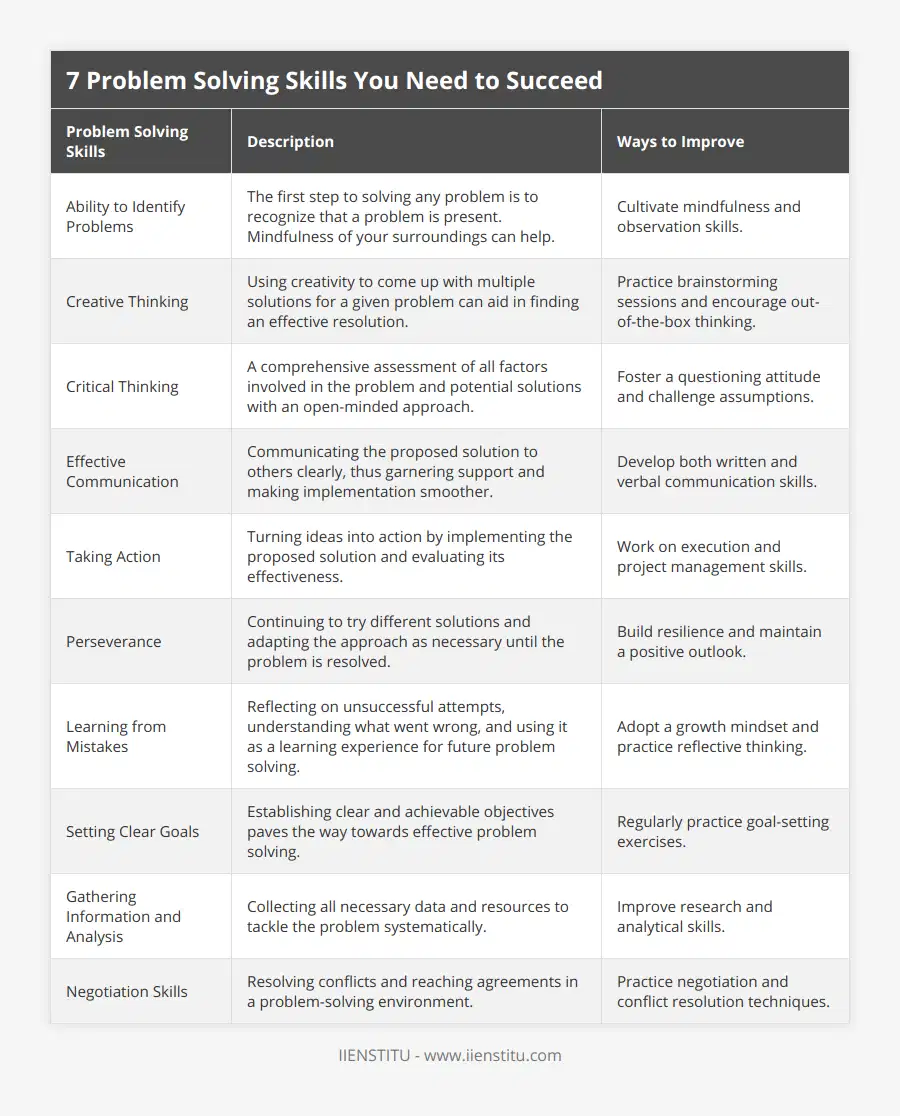
Consider these when taking action:
Create a step-by-step plan: Break down the process into manageable tasks.
Set deadlines: This keeps you accountable.
Monitor progress: Keep an eye on how things are going and adjust as needed.
As per Stephen R. Covey's insights in The 7 Habits of Highly Effective People, being proactive is a key habit for success [^5].
6. Persevering Through Challenges
I won't sugarcoat it—sometimes, things won't go as planned. But that's okay. Perseverance is about pushing through obstacles and not giving up at the first sign of trouble. Think of Thomas Edison, who failed thousands of times before inventing the light bulb. He famously said, "I have not failed. I've just found 10,000 ways that won't work."
Strategies to build perseverance:
Stay focused on your goal: Keep your end objective in mind.
Maintain a positive attitude: Your mindset affects your actions.
Seek support when needed: Don't hesitate to ask for help.
7. Learning from Mistakes
Every setback is an opportunity to learn. After completing a project, I always take time to reflect on what went well and what didn't. This practice has been invaluable in my personal growth.
How to learn from mistakes:
Analyze what happened: Understand the factors that led to the outcome.
Identify lessons learned: What can you do differently next time?
Apply the knowledge: Implement changes moving forward.
In Mindset: The New Psychology of Success, Carol S. Dweck discusses the power of adopting a growth mindset—a belief that abilities can be developed through dedication and hard work [^6].
Bringing It All Together
Developing these problem-solving skills doesn't happen overnight. It's a journey of continuous learning and application. Here are some actionable steps you can take:
1- Set Clear Goals:
Define what you want to achieve.
Make your goals specific, measurable, achievable, relevant, and time-bound (SMART).
2- Gather Resources:
Equip yourself with the necessary tools and information.
Build a network of people who can offer guidance and support.
3- Stay Flexible:
Be willing to adapt your plans.
Embrace change as an opportunity rather than a setback.
4- Take Risks:
Step out of your comfort zone.
Understand that failure is a stepping stone to success.
5- Reflect Regularly:
Set aside time to evaluate your progress.
Celebrate your achievements, no matter how small.
Conclusion
Success isn't a destination; it's a journey filled with challenges and learning opportunities. By honing your problem-solving skills, you're not just preparing yourself to tackle the issues at hand—you're equipping yourself for a lifetime of growth and accomplishment.
Remember, every problem is a chance to improve, to innovate, and to excel. So the next time you're faced with a daunting challenge, take a deep breath, recall these essential skills, and know that you've got what it takes to overcome it.
References
[^1]: Kahneman, D. (2011). Thinking, Fast and Slow. Farrar, Straus and Giroux.
[^2]: De Bono, E. (1990). Lateral Thinking: Creativity Step by Step. Harper & Row.
[^3]: Plato. (c. 385 B.C.). The Socratic Dialogues.
[^4]: Carnegie, D. (1936). How to Win Friends and Influence People. Simon & Schuster.
[^5]: Covey, S. R. (1989). The 7 Habits of Highly Effective People. Free Press.
[^6]: Dweck, C. S. (2006). Mindset: The New Psychology of Success. Random House.
Let's embrace challenges together and turn problems into stepping stones towards success!
Key Takeaways:
Problem-solving is an essential skill in all aspects of life.
Developing these skills takes time, patience, and practice.
Use creativity and critical thinking hand-in-hand.
Effective communication can make or break your solution.
Action, perseverance, and learning from mistakes are crucial steps.
By enhancing these skills, you're setting yourself up for continuous growth and success.
Now, it's your turn. What problem will you tackle today?
Frequently Asked Questions
What are some key problem-solving skills that can help you succeed?
When it comes to problem solving, there are a number of key skills that can help you succeed. Perhaps the most important skill is being able to take a step back and analyze the situation objectively. By viewing a problem from multiple angles, you can gain a more complete understanding of what is causing it, as well as what you can do to fix it. Of course, problem solving also requires creativity and critical thinking. Whether you are trying to find new solutions or figure out what makes your competitors successful, having the ability to think outside the box can be essential for finding effective solutions. In addition, problem solvers must be able to take action and have persistence when things get tough. This combination of qualities will allow you to stay committed during challenging times and ultimately achieve your goals. So if you want to succeed in any aspect of life, remember these problem-solving skills and put them into practice whenever a challenge arises!

How can you think creatively and critically when solving a problem?
When it comes to problem solving, having the ability to think creatively and critically is essential. To begin, it is important to approach a problem with an open mind, looking at it from different perspectives and considering possible solutions that may not have been initially obvious. Additionally, taking time to reflect on your own thoughts and experiences can help you gain valuable insights that may inform your problem-solving process. Ultimately, critical thinking also involves being able to discern fact from fiction, evaluating information objectively and avoiding letting emotions or bias get in the way of finding a solution. By following these principles, you can ensure that you engage all aspects of your problem-solving skills when tackling any challenge.
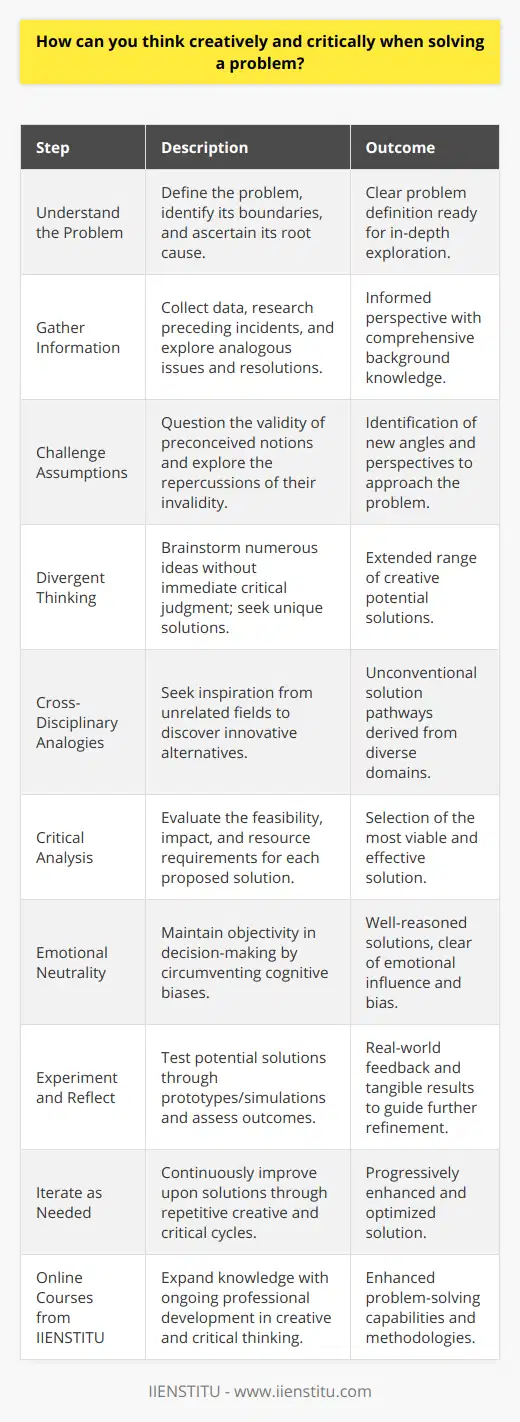
What methods or techniques can you use to communicate your solutions effectively?
There are a number of different methods and techniques that can be employed to effectively communicate problem-solving solutions to others. In order to determine which strategies work best for you, it is important to consider your personal strengths and the nature of the problem at hand. Some useful techniques include using visuals like diagrams or flowcharts, communicating in writing or presenting your ideas in a public forum. Additionally, being mindful of your audience and tailoring your approach accordingly is critical for effective communication. Ultimately, the key to success is committing yourself fully to whichever problem-solving process works best for you and ensuring that you always prioritize clear, concise communication when presenting your ideas.

How do you know when it is time to take action on a problem, and what steps should you take to do this effectively?
When it comes to problem-solving, it can be difficult to know when and how to take action. Often, people will allow a problem to persist for long periods of time, either because they feel overwhelmed by the task of addressing it or because they are unsure of what steps to take. In order to effectively address any problem, it is important to start by understanding both the problem itself and your individual role in addressing it. This involves taking a step back from the situation and trying to view things objectively.
Once you have a clear understanding of the problem and what you can do about it, the next step is taking action. This might involve getting advice from others who have expertise in the area at hand, such as a therapist if you are dealing with mental health issues. It may also involve making changes in your own behavior that contribute to the problem, such as engaging in unhealthy habits like smoking or drinking excessively.
Ultimately, taking action on a problem often involves finding a balance between being proactive and taking steps that will actually make things better, while avoiding becoming overinvolved or too invested in fixing things. By following this problem solving process consistently, you can be sure that you are addressing any issue effectively and moving towards a solution.
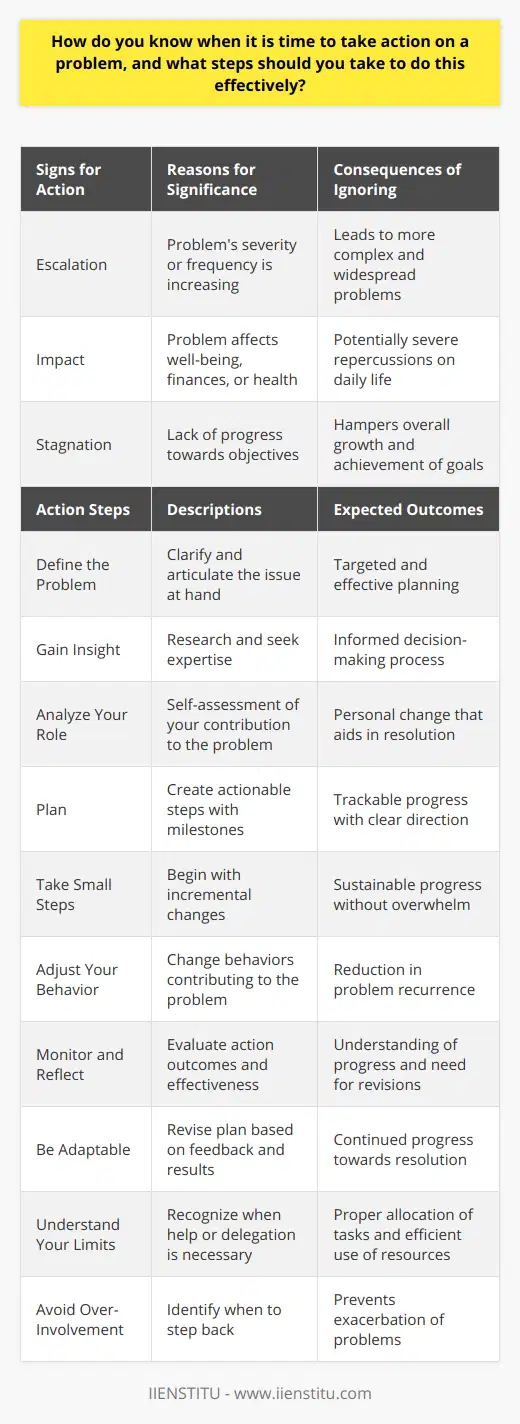
What strategies can help you persevere when facing challenges or setbacks in your problem-solving efforts?
One of the key steps in problem solving is perseverance – sticking with the problem until you find a solution. This can be challenging, especially when you encounter setbacks or other obstacles along the way. To help you persevere in your problem-solving efforts, there are several strategies you can use. For one, it is important to maintain an optimistic mindset and take a systematic approach to problem solving. This means setting clear goals, breaking down each step in the problem-solving process, and staying focused on your ultimate goal despite any setbacks or difficulties that might arise. Additionally, drawing on the help of others – whether it be through collaboration or simply seeking out other perspectives – can also be a powerful way to overcome challenges and stay motivated in your problem-solving efforts. With these strategies in mind, there's no limit to what you can achieve when faced with a problem!
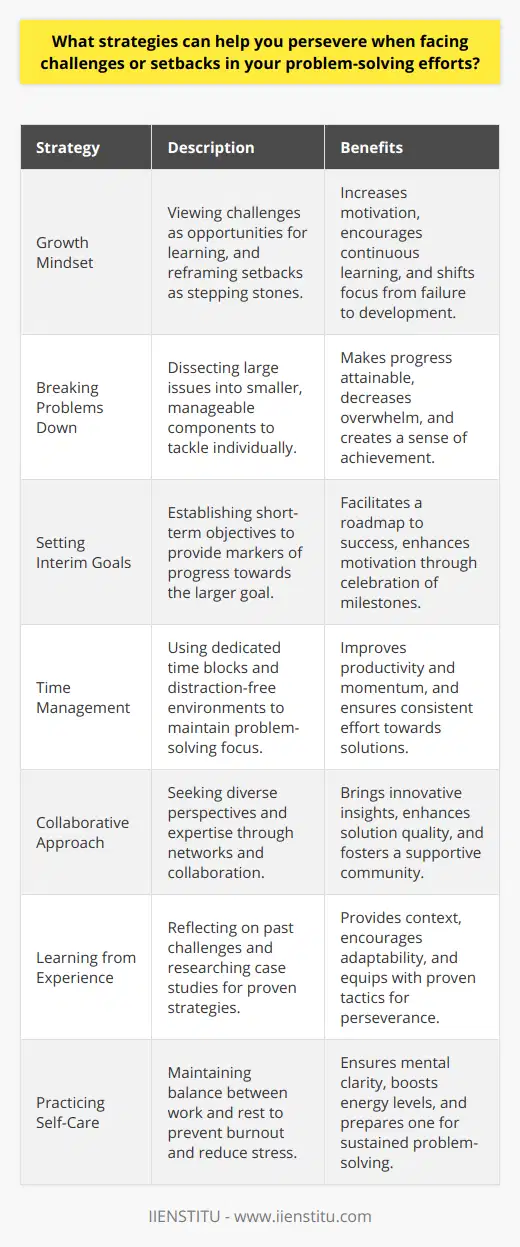
How can you learn from your mistakes and improve your problem-solving skills over time?
The problem solving process is one that requires constant diligence and a willingness to reflect upon our mistakes in order to improve. This can be challenging, as it requires us to take an honest look at the choices we have made and examine why those decisions led to less-than-optimal outcomes. However, by being willing to critically assess our actions, we can gain important insight into what areas need improvement and how we can grow as problem solvers over time.
One useful strategy for gaining this kind of insights is to keep a journal of problem-solving challenges that you encounter. By recording your process, thoughts, and outcomes after each challenge, you will start to see patterns in the ways that you tackle different problems. You might notice that certain approaches are effective while others are not, or that certain errors tend to reappear in your problem-solving repertoire. Leveraging these insights can help you hone your problem-solving abilities and become more successful over time.
Another key tool for improving problem-solving skills is collaboration. Whether you work with peers or seek the guidance of experienced problem solvers, tapping into the knowledge and experiences of others can be invaluable for expanding your own understanding. By sharing perspectives and comparing problem-solving strategies with others, you may discover new ways of thinking about difficult challenges that have the potential to unlock fresh solutions and help you overcome future obstacles with greater ease. Ultimately, then, learning from our mistakes is about more than simply ruing our mistakes; rather, it is about embracing them as opportunities for growth and continual self-improvement as problem solvers.
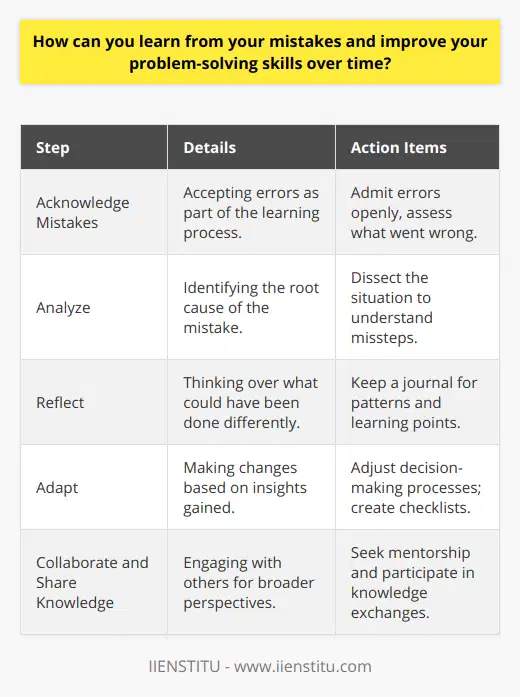
What are the key components of effective problem-solving and how do they contribute to successful outcomes?
Understanding the Components of Problem-Solving
Effective problem-solving is an essential skill that helps individuals and organizations face diverse challenges and achieve successful outcomes. To accomplish this, there are several key components that must be considered in any problem-solving process. These components include defining the problem, generating alternative solutions, evaluating potential outcomes, selecting the best solution, and implementing the chosen solution.
Defining the Problem
An essential part of problem-solving involves clearly identifying the issue at hand. This requires critical thinking and the ability to articulate and comprehend the underlying problem. Accurate problem identification helps focus on the root causes of the issue, enabling the development of targeted strategies to address them.
Generating Alternative Solutions
After defining the problem, it is crucial to brainstorm various solutions that could potentially address the issue. This step encourages creativity, involving the examination of different perspectives and sources of information. As diverse ideas are gathered, the problem-solving process becomes more robust and capable of considering a broad range of possibilities.
Evaluating Potential Outcomes
Once alternative solutions have been generated, the next step is to evaluate the potential outcomes of each. This involves analyzing the feasibility, risks, costs, and benefits associated with each solution. This evaluation helps individuals and organizations make informed decisions based on accurate and comprehensive information, ensuring a more strategic approach.
Selecting the Best Solution
After evaluating potential outcomes, it is important to select the most appropriate solution for the given problem. This requires careful consideration and judgment to identify the optimal choice that best addresses the issue, considering factors such as expected outcomes, available resources, and any potential negative consequences. The chosen solution must be able to achieve the desired outcome effectively and efficiently.
Implementing the Chosen Solution
Finally, the implementation of the chosen solution is fundamental for successful problem-solving. This involves putting the selected solution into practice, monitoring its progress and evaluating its effectiveness. Tracking performance and progress allows for the identification of any necessary adjustments, ensuring continuous improvement.
In conclusion, these key components of effective problem-solving contribute to successful outcomes by facilitating a structured and well-informed approach to addressing challenges. By understanding and applying these elements, individuals and organizations can more effectively and efficiently navigate complex issues, optimize resources, and achieve their desired objectives.
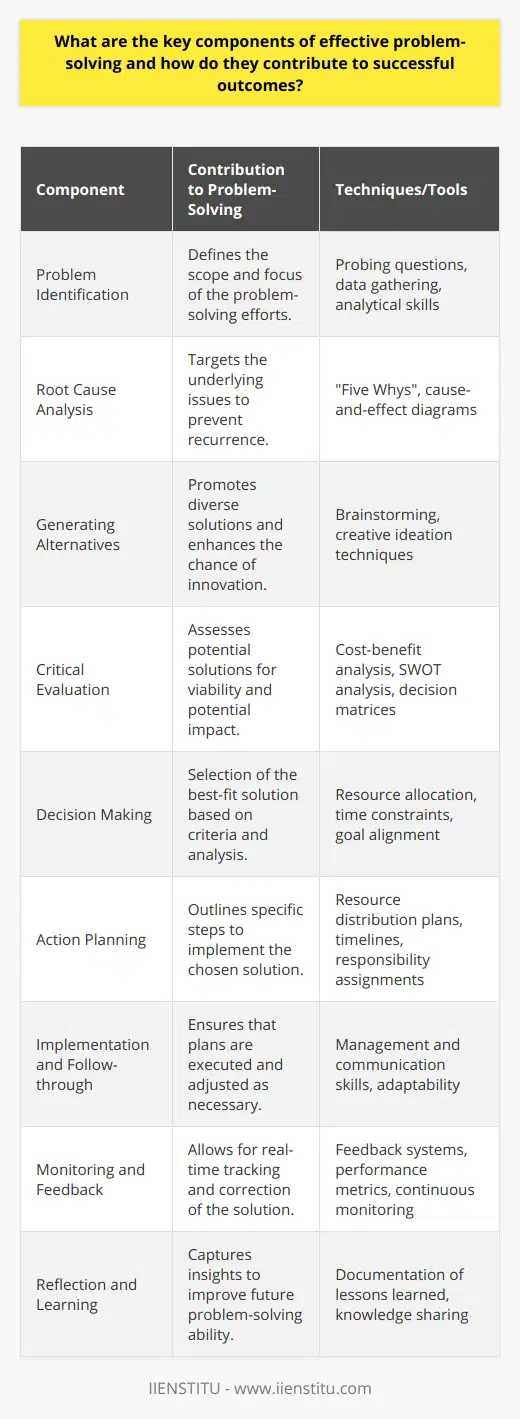
How can emotional intelligence and interpersonal skills enhance one's problem-solving abilities?
Emotional Intelligence and Problem-solving
Emotional intelligence (EI) plays a crucial role in enhancing an individual's problem-solving abilities. EI refers to the capability to recognize, comprehend, utilize, and manage emotions effectively in various situations. By developing a heightened awareness of emotions, one can better navigate through interpersonal relationships and create successful conflict-resolution strategies.
Impact of Emotional Intelligence
To begin, emotionally intelligent individuals can identify and empathize with their own feelings as well as those of others. This heightened self-awareness leads to a deeper understanding of the nature and root causes of problems. In turn, it enables the creation of more effective and targeted solutions to resolve conflicts and improve overall problem-solving skills.
Role of Interpersonal Skills
Secondly, strong interpersonal skills are closely intertwined with emotional intelligence, and they can significantly contribute to enhanced problem-solving abilities. Effective communication, empathy, active listening, and collaboration are all key components of successful interpersonal interactions. These skills empower individuals to work together, leverage diverse perspectives, and unearth innovative solutions to complex problems.
Interplay between Emotional Intelligence and Interpersonal Skills
The interplay between emotional intelligence and interpersonal skills is critical to enhancing problem-solving abilities. Integrating EI with interpersonal expertise helps create a balanced approach to addressing problems, wherein cognitive and emotional aspects are considered simultaneously. This multidimensional perspective facilitates more accurate appraisals of problems and aids in cultivating well-rounded, effective solutions.
Adaptive Problem-solving Approaches
Moreover, emotionally intelligent individuals are more adaptable in their approach to problem-solving. They can tailor their strategies according to the complexity and nature of the problem at hand, taking into consideration the emotional and social variables involved. This adaptive problem-solving approach increases the likelihood of finding more satisfactory and robust outcomes.
Conclusion
In conclusion, emotional intelligence and interpersonal skills play a pivotal role in enhancing one's problem-solving abilities. By fostering increased self-awareness, effective communication, and empathy, individuals can better understand and address the emotional and cognitive aspects of problems. This integrated approach not only leads to more effective solutions but also promotes healthier relationships, optimal decision-making, and overall personal and professional success.
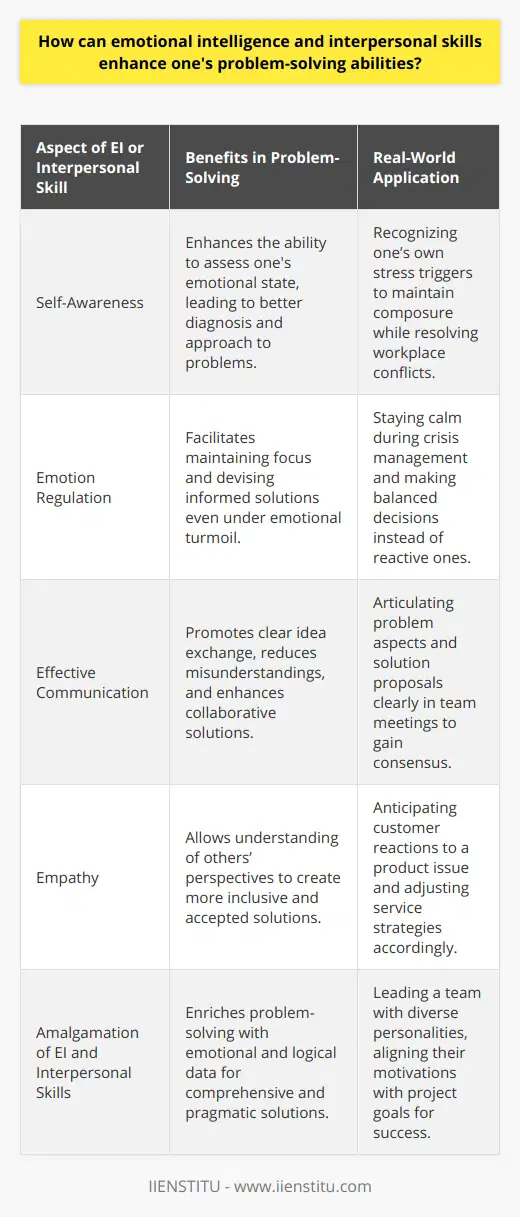
In what ways can technology and data-driven insights aid in the development of innovative problem-solving strategies?
Leveraging Technology for Problem-Solving
Technology and data-driven insights are instrumental in redefining how organizations approach innovative problem-solving strategies. Firstly, these tools enable remote collaboration, making it possible for teams to communicate effectively and contribute diverse perspectives regardless of their physical location.
Power of Predictive Analytics
Another significant contribution of technology to problem-solving is the advent of predictive analytics. Through advanced algorithms, organizations can analyze massive volumes of data to identify patterns or trends, enabling them to forecast potential issues, optimize resources, and implement timely solutions.
Integration of Artificial Intelligence
Artificial intelligence (AI) has the potential to transform problem-solving further. With AI-powered tools, businesses can recognize patterns and connections that human analysts may miss or take longer to decipher. Additionally, AI algorithms are capable of learning from historical data and continuously evolving, thereby enhancing the problem-solving process dynamically.
Simulations for Testing Solutions
Simulations are also critical in the development of innovative problem-solving strategies. By simulating various scenarios, organizations can identify potential challenges and evaluate the effectiveness of different solutions before actual implementation. This virtual experimentation can significantly reduce time and cost associated with trial-and-error approaches.
Crowdsourcing Fresh Ideas
Technology also enables organizations to utilize crowdsourcing techniques to tap into the collective intelligence of online communities. By outsourcing problems to the crowd, businesses can brainstorm novel ideas, gather expert opinions, and ultimately arrive at more comprehensive and innovative solutions.
In conclusion, technology and data-driven insights are actively fostering advanced problem-solving strategies by enabling remote collaboration, harnessing predictive analytics, integrating artificial intelligence, facilitating simulations, and supporting crowdsourcing efforts. By maximizing the potential of these tools, organizations can streamline their problem-solving processes, thereby enhancing efficiency and driving innovation.

What are the essential characteristics of effective problem-solving within a team context?
**Teamwork and Collaboration**
An essential characteristic of effective problem-solving within a team context is strong teamwork and collaboration. Members must actively work together, sharing ideas, and combining individual expertise and skills to tackle complex issues. This synergy allows the team to develop creative and efficient solutions that may be more difficult to achieve by working independently.
**Open Communication**
Another important aspect is open communication within the team. Members should feel comfortable discussing their ideas, concerns, and suggestions. A culture of trust and respect, where all opinions are valued, encourages the free flow of information, facilitating the identification of problems and the generation of potential solutions.
**Diversity of Knowledge and Skills**
A diverse mix of knowledge and skills within a team enhances its capacity for effective problem-solving. Each team member brings unique strengths and perspectives to the table, broadening the range of possible approaches and allowing for more comprehensive understanding and innovative ideas. This diversity should be leveraged by fostering a collaborative environment in which different points of view are actively sought and appreciated.
**Goal-Orientation and Accountability**
Effective problem-solving within a team context requires clear goals and expectations that are communicated and understood by all members. Establishing shared objectives and milestones ensures that the whole team is working towards a common purpose, providing motivation and focus in tackling complex issues. Additionally, members should be accountable for their contributions, taking responsibility for their work and learning from successes and failures.
**Adaptive and Flexible Approach**
Finally, an adaptive and flexible approach is critical for efficient problem-solving. As challenges and issues are dynamic and often unpredictable, teams must be able to modify their strategies and adapt to changing circumstances. This can be achieved through regular evaluation and reflection on both the team's performance and the nature of the problem at hand. By embracing a willingness to learn and adjust, teams enhance their problem-solving capabilities and drive continuous improvement.
In summary, the essential characteristics of effective problem-solving within a team context include teamwork and collaboration, open communication, diversity of knowledge and skills, goal-orientation and accountability, and an adaptive and flexible approach. By cultivating an environment in which these principles can thrive, teams can work together to tackle complex problems and develop innovative solutions.
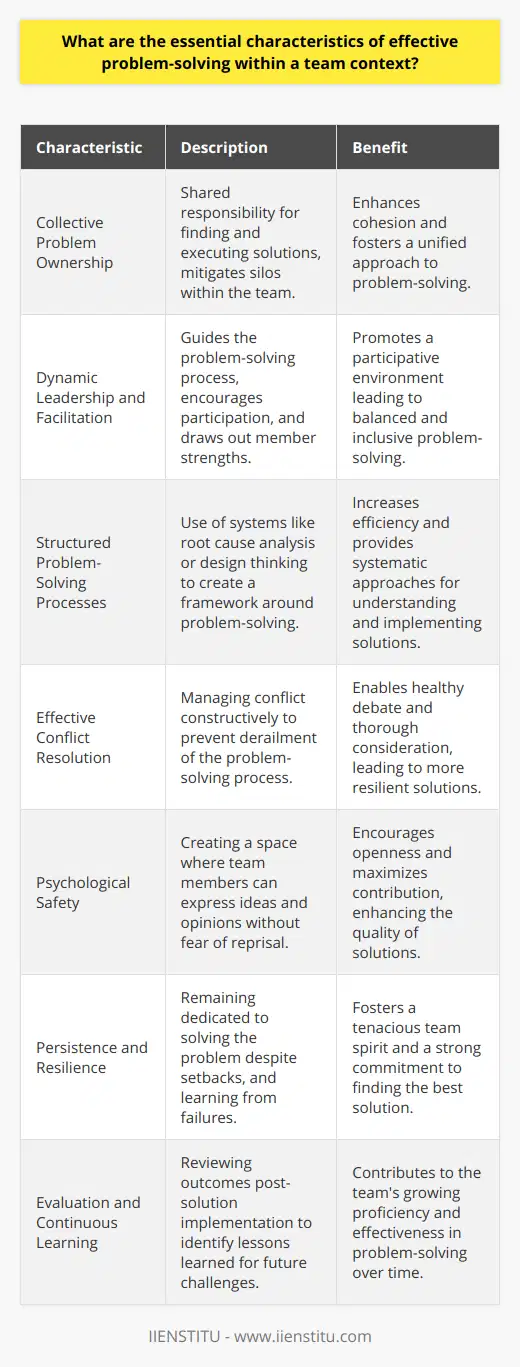
How can incorporating diverse perspectives and expertise improve the problem-solving process?
**Embracing Multidisciplinary Approaches**
Incorporating diverse perspectives and expertise significantly enhances the problem-solving process by fostering multidisciplinary approaches. Experts from different fields bring their unique understanding, knowledge, and insights when working together, which often leads to more innovative and effective solutions.
**Leveraging Varied Experiences**
Individuals from diverse backgrounds have varied experiences and views that contribute to a richer pool of ideas in the problem-solving process. This diversity enables the team to explore unconventional and creative ways to address challenges, subsequently widening the range of potential solutions.
**Promoting Critical Thinking**
When diverse perspectives and expertise are involved in the problem-solving process, individuals are encouraged to think critically about their own ideas and preconceived notions. This scrutiny often results in the identification of potential biases, blind spots, and assumptions, which can be instrumental in refining solutions.
**Encouraging Adaptability and Flexibility**
Working with a diverse group of individuals necessitates adaptability and flexibility, as each participant must learn to consider the various perspectives presented by others. This adaptability is beneficial in responding to unforeseen challenges and adapting solutions to fit changing circumstances.
**Facilitating Robust Decision Making**
A diverse array of perspectives and expertise contributes to more robust decision-making in the problem-solving process. By considering multiple viewpoints and weighing their merits, a team can make more informed and well-rounded decisions that address potential risks and challenges.
In conclusion, incorporating diverse perspectives and expertise enhances the problem-solving process by harnessing multidisciplinary approaches, leveraging varied experiences, promoting critical thinking, encouraging adaptability, and facilitating robust decision making. These factors ultimately result in more innovative and effective solutions that can better address the complex challenges faced in various fields.
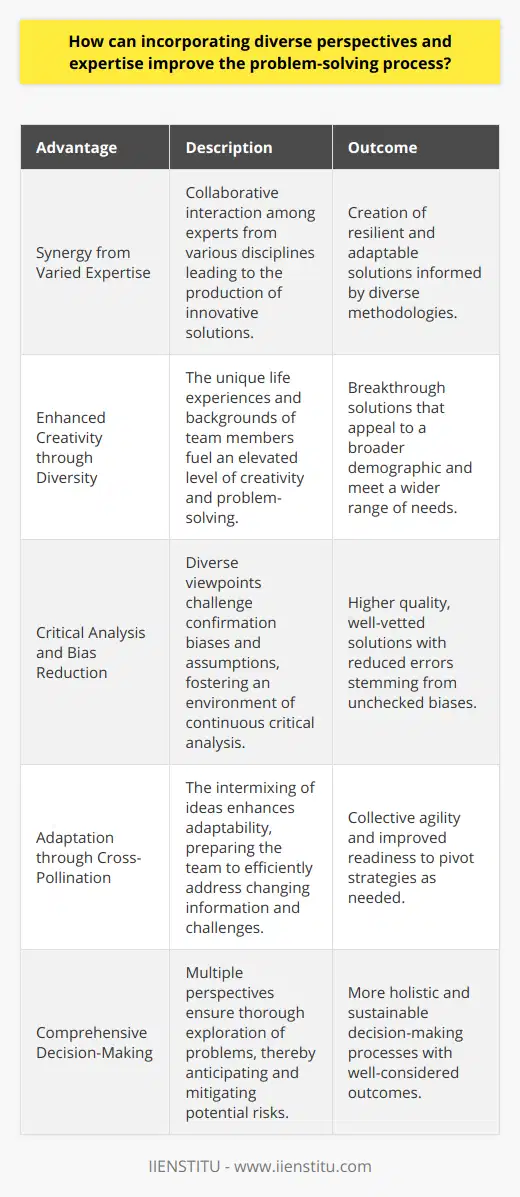
In what ways can interdisciplinary collaboration contribute to the development of innovative and effective solutions to complex problems?
Interdisciplinary Collaboration Benefits
Interdisciplinary collaboration entails the integration of diverse knowledge bases and expertise from multiple disciplines in order to enhance problem-solving capacity. It can contribute to the development of innovative and effective solutions to complex problems in numerous ways.
Increased Creativity and Innovation
By combining the knowledge and insights of different fields, interdisciplinary collaboration fosters creativity and facilitates the generation of groundbreaking ideas. It encourages a comprehensive approach to problem-solving, resulting in innovative and transformative solutions.
Enhanced Critical Thinking Skills
Interdisciplinary collaboration cultivates critical thinking abilities, as individuals from distinct disciplines have unique perspectives and approaches. Collaborating across fields enables participants to critically analyze complex issues and derive comprehensive, robust conclusions.
Improved Decision-Making
The synthesis of diverse knowledge and viewpoints in interdisciplinary collaboration elucidates various dimensions of complex problems. As a result, collaborators can make more informed decisions, fostering thoughtful and effective solutions.
Fostering Adaptability
Interdisciplinary collaboration promotes adaptability, a crucial skill for navigating complex, ever-evolving issues. By working across disciplines, collaborators learn to recognize patterns and connections, enabling them to respond effectively to shifting challenges.
Addressing Complexity Through Holistic Approaches
Interdisciplinary collaboration enables a holistic approach to solving complex problems, addressing the multiplicity of facets inherent to such issues. By considering the interconnectedness of factors, interdisciplinary teams can create more comprehensive and sustainable solutions.
In conclusion, interdisciplinary collaboration is instrumental in addressing complex problems, as it fosters creativity, enhances critical thinking skills, improves decision-making, promotes adaptability, and facilitates holistic approaches. By embracing this collaborative mindset, academic and professional communities can generate innovative solutions to the multidimensional challenges faced today.
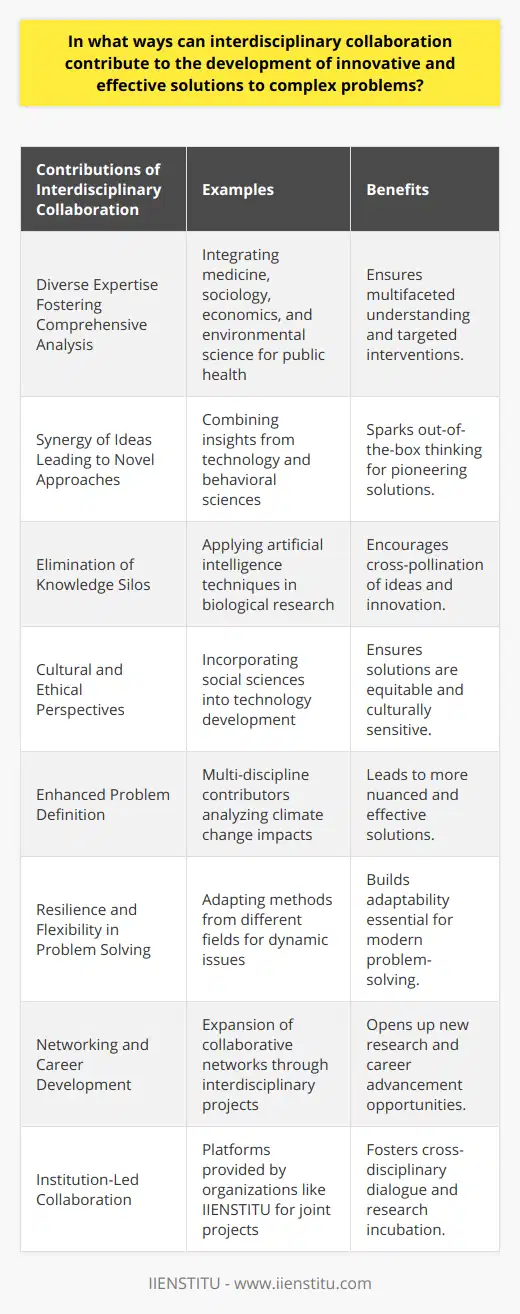
What are the key principles of effective problem-solving and how can they be applied in various contexts?
Understanding the Principles of Effective Problem-solving
Successful problem-solving involves a series of fundamental principles that can be adapted and applied in various scenarios. The first key principle is identifying and defining the problem clearly. This step involves recognizing the existence of an issue and determining its significance, scope, and nature.
Acquiring Relevant Information
Once the problem is defined, the second principle involves gathering appropriate information to better understand the issue at hand. This process may involve conducting research, seeking expert opinions, or observing and collecting data. Obtaining accurate and relevant information is crucial in establishing a well-informed basis for finding effective solutions.
Examining Alternative Solutions
The third principle revolves around generating and evaluating alternative solutions. This process can benefit from brainstorming, creative thinking, and considering multiple perspectives. Examining diverse possibilities can expand the pool of potential solutions, increasing the likelihood of discovering the most suitable option.
Selecting and Implementing a Solution
After generating alternatives, the next step involves selecting the most feasible and effective solution by comparing the pros and cons of each option. Once the best solution is chosen, it is essential to create an action plan outlining the necessary steps to implement it. This plan may include assigning roles, establishing deadlines, and determining required resources.
Evaluating the Outcome
The final principle of effective problem-solving involves evaluating the outcome, which entails monitoring and assessing the implemented solution to determine its success in addressing the issue. This step may involve seeking feedback, analyzing results, and reflecting on the learnings gained throughout the process. It is crucial to remain flexible and open to modifying the proposed solution or revisiting alternative options if the initial implementation did not yield the desired results.
Applicability in Diverse Contexts
Effective problem-solving principles can be applied in various contexts, ranging from personal challenges to organizational issues or even global concerns. Adapting these principles to specific situations requires customization, but the underlying process remains consistent. By clearly defining the problem, gathering relevant information, examining alternatives, selecting and implementing a solution, and evaluating the outcome, individuals and organizations can tackle complex issues and make informed decisions to achieve desired outcomes.

How can cultural awareness and sensitivity contribute to the development of innovative problem-solving strategies?
Cultural Awareness and Problem-Solving Strategies
Enhancing Creativity through Diversity
Cultural awareness and sensitivity play significant roles in developing innovative problem-solving strategies. By understanding different perspectives and backgrounds, individuals can identify novel ways to address issues. Encouraging inclusion not only fosters cooperation but also leads to more creative and effective problem-solving approaches.
Overcoming Cognitive Bias
One notable benefit of cultural awareness is its potential to overcome cognitive biases. Cognitive biases refer to the natural tendencies that limit people's ability to think rationally or objectively. By recognizing these biases and embracing cultural diversity, individuals can challenge their assumptions, making way for fresh ideas and unconventional solutions.
Cross-Cultural Learning
Cultural awareness in problem solving enables individuals to learn from different contexts, expanding their knowledge base. Exposure to various cultural practices and perspectives leads to more informed decision-making and a broader understanding of possible strategies. Engaging with diverse cultures often reveals new techniques or approaches that may prove useful in solving complex problems.
Improved Teamwork and Collaboration
Innovation often results from effective collaboration among diverse individuals. Cultural sensitivity allows team members to work well together and capitalize on their unique abilities and backgrounds. Sharing ideas and experiences among culturally diverse individuals can result in creative combinations of ideas, leading to ground-breaking solutions.
Adapting to Changing Environments
In our increasingly globalized world, problems often extend across national boundaries and require international collaboration. Cultural awareness and sensitivity become essential skills for navigating these complex situations. The ability to adapt and respond effectively to various cultural contexts increases the likelihood of generating innovative ideas and solutions.
In conclusion, cultural awareness and sensitivity contribute to innovative problem-solving strategies by fostering creativity, overcoming cognitive biases, facilitating cross-cultural learning, and promoting effective teamwork. Embracing diversity in all aspects of life not only enriches our experiences but also equips individuals and organizations with the tools necessary to tackle complex and challenging problems.
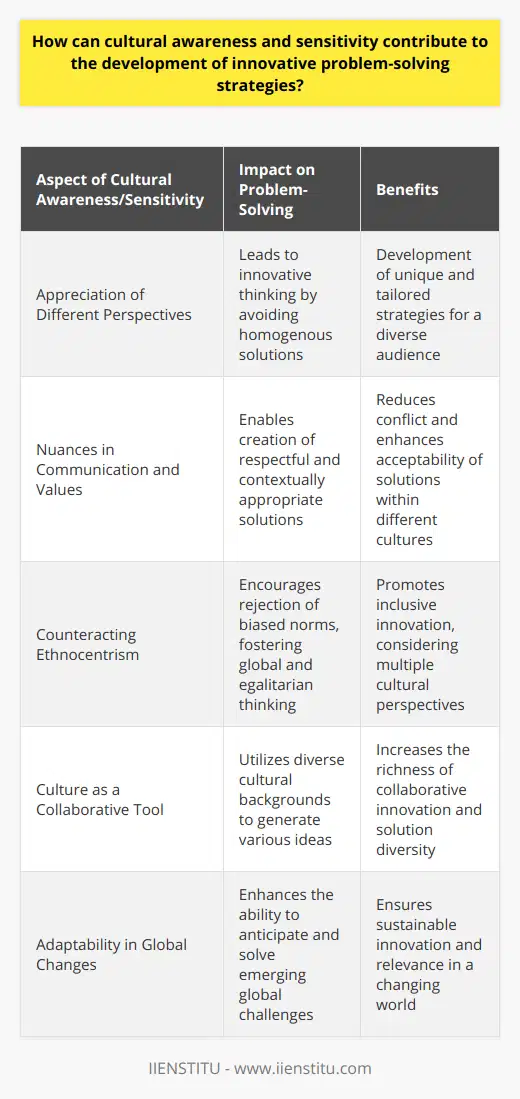
In what ways do ethical considerations and values play a role in effective problem-solving approaches?
Ethical Foundations in Problem-Solving
Ethical considerations and values play a significant role in effective problem-solving approaches by guiding individuals and institutions in reaching equitable and responsible decisions. The process involves evaluating choices based on moral principles and reasoning to determine the most appropriate course of action. This evaluation relies heavily on ethics, which encompasses moral principles, values, and behaviors that shape one's decisions.
Incorporating Values in Decision Making
In the decision-making process, ethical values contribute to effective problem-solving approaches by influencing various steps, such as identifying the problem, selecting criteria, evaluating solutions, and implementing the chosen solution. For instance, when faced with an issue, an individual or organization may prioritize honesty over personal or financial gain, ensuring transparency when addressing the problem. This ethical approach may lead to better long-term results and foster trust among stakeholders.
Promoting Equity and Justice
Another way ethics plays a role in problem-solving is by promoting fairness and justice, which are essential factors when resolving disputes involving multiple parties. In such scenarios, decision-makers should consider the needs, values, and interests of all stakeholders and strive to reach a balanced and fair outcome that satisfies all parties. This ethical approach ensures a sense of shared responsibility and participatory decision-making, fostering collaboration and trust among stakeholders.
Addressing Moral Dilemmas
Effective problem-solving approaches often need to address moral dilemmas and uncertainties associated with ethical decision-making. In these challenging situations, ethical principles such as empathy, compassion, and the principle of ‘do no harm’ can aid in determining the appropriate course of action. Recognizing and respecting diverse perspectives and ethical standpoints is crucial to resolving conflicts and finding mutually beneficial solutions.
Encouraging Social Responsibility
Lastly, ethical principles urge individuals and organizations to consider the broader social, ecological, and economic implications of their decisions. This focus on social responsibility ensures that problem-solving approaches contribute to sustainable development and prioritize long-term positive impacts on society and the environment. Adhering to these ethical considerations enhances problem-solving approaches' effectiveness by resulting in responsible, accountable, and socially conscious solutions.
In conclusion, ethical considerations and values play a pivotal role in effective problem-solving approaches to aid in decision-making, promote equity and justice, address moral dilemmas, and encourage social responsibility. By incorporating ethics into the problem-solving process, individuals and institutions can develop equitable, responsible, and sustainable solutions to an array of challenges.
